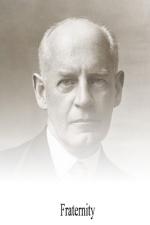Thyme raised her eyes obediently. In this main thoroughfare it was not as in the by-street, and only dull or sullen glances, or none at all, were bent on her. Some of the houses had ragged plants on the window-sills; in one window a canary was singing. Then, at a bend, they came into a blacker reach of human river. Here were outbuildings, houses with broken windows, houses with windows boarded up, fried-fish shops, low public-houses, houses without doors. There were more men here than women, and those men were wheeling barrows full of rags and bottles, or not even full of rags and bottles; or they were standing by the public-houses gossiping or quarrelling in groups of three or four; or very slowly walking in the gutters, or on the pavements, as though trying to remember if they were alive. Then suddenly some young man with gaunt violence in his face would pass, pushing his barrow desperately, striding fiercely by. And every now and then, from a fried-fish or hardware shop, would come out a man in a dirty apron to take the sun and contemplate the scene, not finding in it, seemingly, anything that in any way depressed his spirit. Amongst the constant, crawling, shifting stream of passengers were seen women carrying food wrapped up in newspaper, or with bundles beneath their shawls. The faces of these women were generally either very red and coarse or of a sort of bluish-white; they wore the expression of such as know themselves to be existing in the way that Providence has arranged they should exist. No surprise, revolt, dismay, or shame was ever to be seen on those faces; in place of these emotions a drab and brutish acquiescence or mechanical coarse jocularity. To pass like this about their business was their occupation each morning of the year; it was needful to accept it. Not having any hope of ever, being different, not being able to imagine any other life, they were not so wasteful of their strength as to attempt either to hope or to imagine. Here and there, too, very slowly passed old men and women, crawling along, like winter bees who, in some strange and evil moment, had forgotten to die in the sunlight of their toil, and, too old to be of use, had been chivied forth from their hive to perish slowly in the cold twilight of their days.
Down the centre of the street Thyme saw a brewer’s dray creeping its way due south under the sun. Three horses drew it, with braided tails and beribboned manes, the brass glittering on their harness. High up, like a god, sat the drayman, his little slits of eyes above huge red cheeks fixed immovably on his horses’ crests. Behind him, with slow, unceasing crunch, the dray rolled, piled up with hogsheads, whereon the drayman’s mate lay sleeping. Like the slumbrous image of some mighty unrelenting Power, it passed, proud that its monstrous bulk contained all the joy and blessing those shadows on the pavement had ever known.
The two young people emerged on to the high road running east and west.




